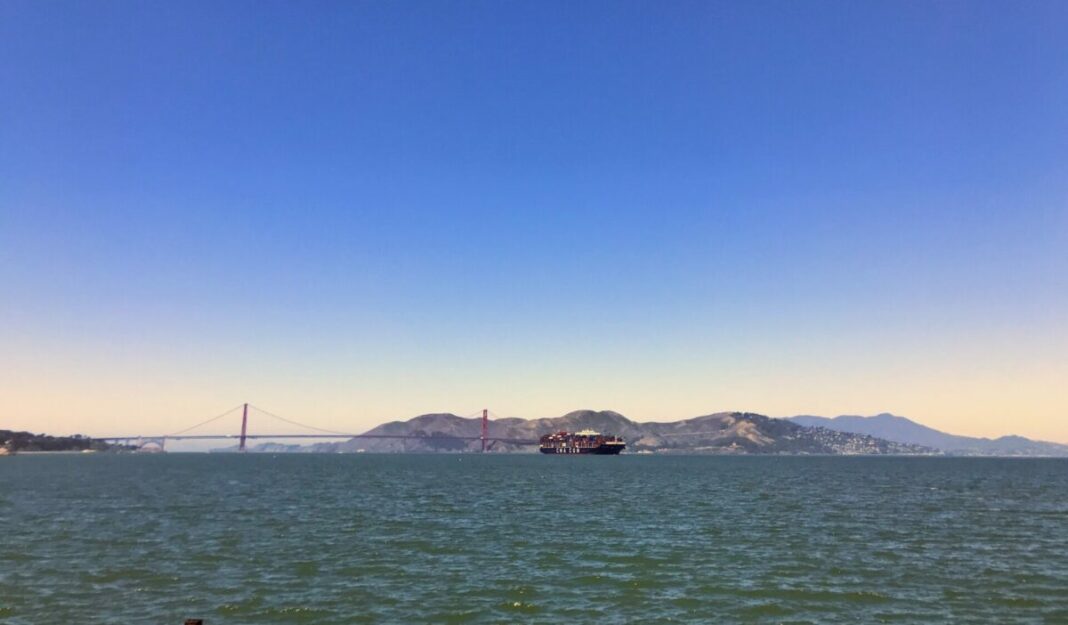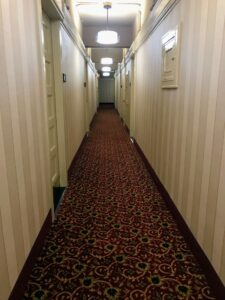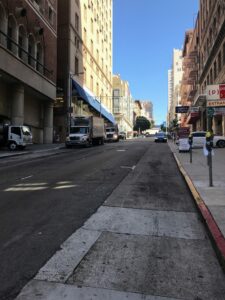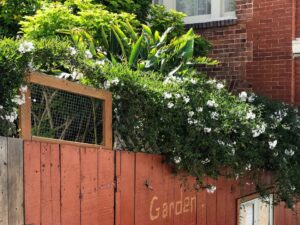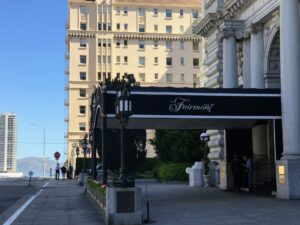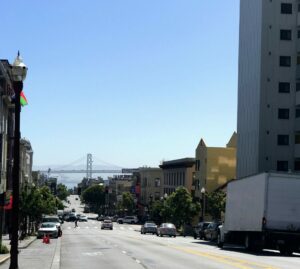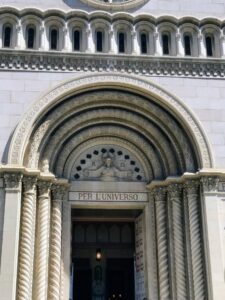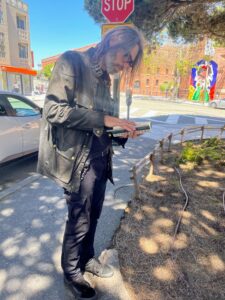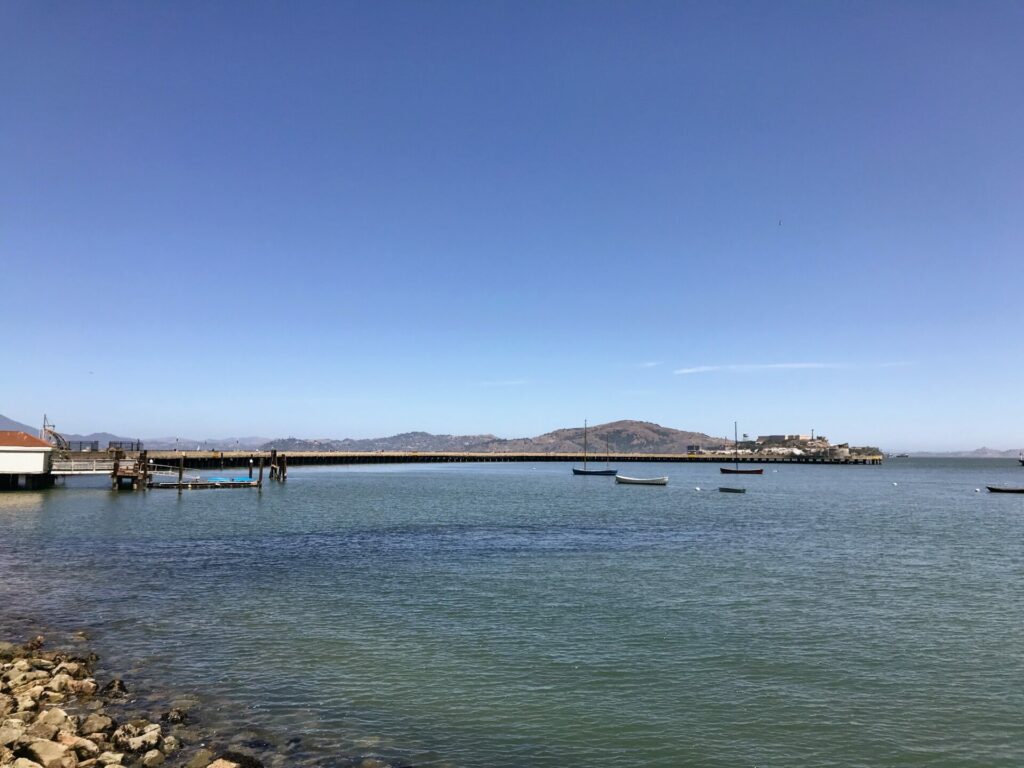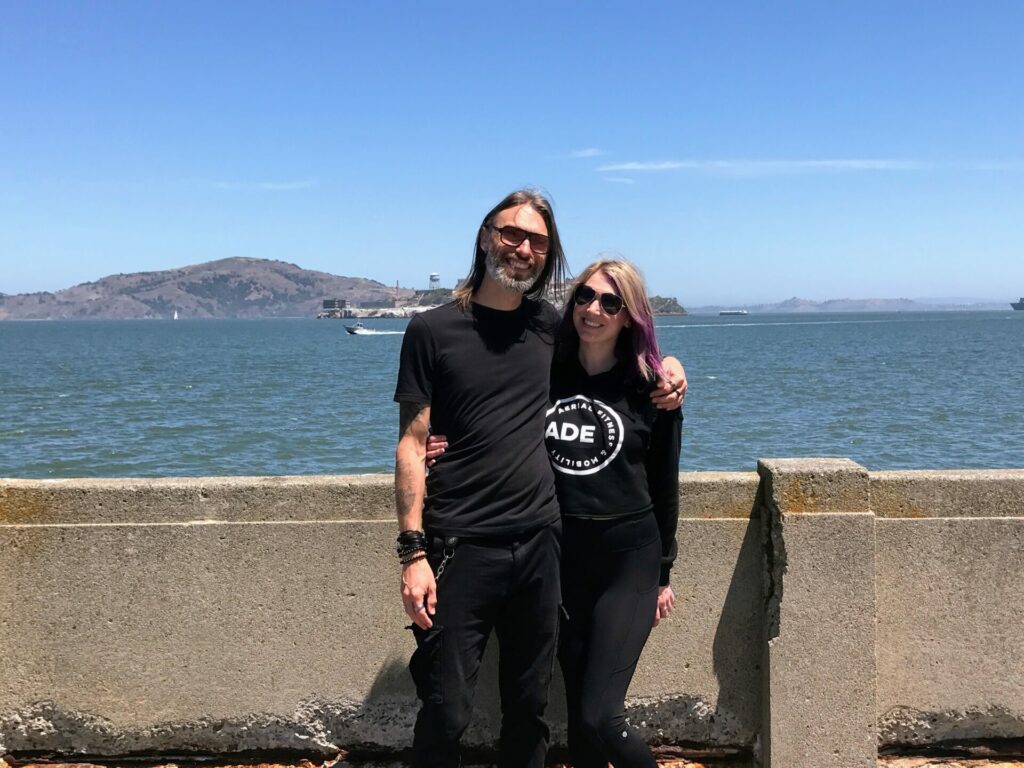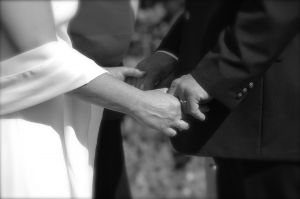San Francisco, CA. “Have you talked to your friend Aaron recently?” A favourite conversation ritual I have with my mother is asking each other about our friends. Her besties are my friends’ moms. I have no gauge for whether these overlaps are unusual because in my circles it happens all the time. We’re all Mennonites.
Turns out Aaron is getting married. I didn’t know it at the time, but my mother knew because the “Mennonite Mothers Network,” as Aaron calls them, keeps a firm grip on the pulse of their sons’ private affairs. In two months, Aaron will marry Danae in Pleasant Hill, California.
I happened to be developing an essay on food and eating practices in Wendell Berry’s novels at the time. I was re-reading Remembering while booking flights to and hotels in the Bay Area. I’ve written on this novel before and have been to San Francisco many times, and yet as I plotted out the trip on Google Maps it dawned on me that I’ve never traced Andy’s trek to the bay—the first leg of his pilgrimage toward being re-membered with Port William.
The impetus for following in Andy’s footsteps was to see how that bodily experience might shape how I read Remembering. I was only planning to walk the walk but after Jeffrey Bilbro caught wind of it, he asked if I would also talk the talk—FPR readers might be interested to hear about the experience. Despite the surplus of essays on this novel, no one, as far as I could tell, had rambled Andy’s San Francisco route detailed in the titular chapter three, “Remembering,” and written about it. In a moment that I can now see was clearly one of sabbatical-induced insouciance, I figured why not?
Context is important, both for Andy’s walk and for my own. My sabbatical was definitely this essay’s condition of possibility but upon reflection the experiential impact on the text’s meaning was informed not only by walking the streets but also the occasion of marriage. Andy’s relationship with Flora is the bellwether of his connection to the rest of their community, yet she plays a minor role. The story is about Andy’s integration. Not just how he learns to meaningfully participate in his agricultural community after the loss of his dominant hand but how he learns to accept his fears, anger, and insecurities. Remembering is one of my favorite Berry novels, second only to Jayber Crow, because of how it depicts Andy’s transformation. He becomes whole not by resisting the parts of himself that cause him grief and withdrawal but by incorporating them in the most literal sense: allowing them to be part of how he embodies his social and romantic relationships. Andy learns that membership doesn’t come from exiling anxieties but trusting that the love binding together community is capacious enough to both make a home for and reorient wayward traits and maimed bodies toward higher unity. For Andy, integration is the product not of the institution of marriage on its own, but of a broader network of communal memories and practices.
Full disclosure: I’m divorced. I’ve spent the last four years working with my therapist to recognize how my marriage was a disintegrating force for both of us and that if I wanted to be whole then I would need to learn how to make a home for and reorient my anger, shame, guilt, and self-doubt. Perhaps this is why I like Remembering so much and why I read it the way I do. Readers are free to disagree, of course, with how I understand the meaning both of the novel and of marriage itself. But my experience wending downtown to Aquatic Park cannot be separated from it. My Mennonite community, the one gathering at Aaron’s wedding, has the spot and wrinkle of failed marriages. Aaron’s wedding is his bride-to-be’s second. Another friend has had three.
Divorce is a difficult experience for all involved, but in all these cases it has seemed to have been particularly hard for our parents to manage its blemishes. Perhaps it’s unsurprising that Mennonites of my parents’ generation have struggled to come to terms with what they see as, shall we say, extra-traditional romantic relationships: remarrying, living together, serial monogamy, polyamory, and same-sex marriage spring to mind. I ask myself if Berry would be more sympathetic with my parents’ traditional sensibilities than with my position toward sexuality as lived experience. Or if those are mutually exclusive. But I’m reminded that, for Berry, disintegration is widespread and takes many forms. When Laura Dunn, the director of Look & See acknowledges that she comes from divorce, Berry interrupts her: “We all come from divorce! This is an age of divorce. Things that belong together have been taken apart. And you can’t put it all back together again.” That idea of belonging continues to haunt me. But it’s clear that both Berry and I see how sexual forms of disintegration are not dissimilar from this broader pattern of dismemberment: How are we made whole?
First, though, we must dwell on disintegration. How do we become divided? San Francisco is Berry’s setting for Andy’s alienation. Put dramatically, Berry casts the Golden City in the role of hell. Berry’s love of Dante and its influence on Remembering is well known. Agrarians may be satisfied to see San Francisco presented as Inferno, even if it’s a bit heavy-handed. But isn’t it perfect? California as a state is insufferably pretentious. Its liberalism is self-righteousness masquerading as social justice. It’s the opposite side of the same coin as Texas: mash-ups of exceptionalism with national patriotism in condescending evangelism. They both tell the rest of America, “you could be better citizens like us if you weren’t such sellouts.”
At this point it’s best to disclose that my ex-wife is Californian with family in Texas. Take everything I say about either place with a grain of salt. But it’s apropos to Remembering because Berry, too, has an ambivalent relationship with Northern California. Tanya has roots in Berkeley. Berry’s time at Stanford as both a writing fellow from 1958-60 and then as visiting professor between 1968-69 produced parts of Nathan Coulter and The Hidden Wound respectively. Wallace Stegner and Gary Snyder, both Californians, have been significant influences on Berry’s writing and life through their ongoing mentorship and friendship. Jack Shoemaker is a Californian and has published Berry mostly from the Bay Area. So why is San Francisco the physical landscape of Andy’s spiritual crumbling?
It’s good to keep in mind that Andy Catlett is a very autobiographical character. Berry enthusiasts have long intimated the connection but Berry himself has acknowledged the connection more explicitly in recent years. With the obvious exception of Berry’s functional right hand, their life stories parallel one another closely. There’s a good case to be made that Andy’s missing hand is, at least in part, an embodiment of Berry’s own struggles with a visceral sense of disintegration. So, it’s unlikely a coincidence that San Francisco is the landscape for Andy’s struggle.
Stanford was where Berry learned that he is a “placed person.” Stegner’s influence here cannot be overstated; however, we also know that when Berry was a visiting professor at Stanford, Stegner tried to persuade him to stay there, “where the action was.” During that same time, Berry found himself amidst a civil rights protest on the quad wondering aloud, “What’s going on?” A protestor Berry describes as “a young white man”—whom Berry was not speaking to—answered in “utter fury: ‘You damned well better find out!’” Berry took this rage to be the result of the man’s assumption that Berry’s Kentucky accent betrayed his racism, as he describes in The Hidden Wound. So it’s not totally surprising that at this time Berry became “hungry to be at home again.” In his “Notes from an Absence and a Return” he explains, “I want back the clear, exacting sense of myself that I only get from being at work there on my writing and on the place itself.” Berry discovers and embraces his Kentuckian fate in Palo Alto.
And yet Berry adds that the difference between his lives in California and Kentucky is “not the difference between isolation and community.” Sure, life at Stanford was “radically unlike” life at home. But the Berrys still found community there—one that survives separation. So, too, the life they returned to was built from hardships and isolation. The Camp where the Berrys lived after they married was where Wendell “had made of loneliness a good thing.” It was Tanya, the California girl, who “came as a stranger” and made Wendell “feel more free and comfortable in it” than ever before. Berry’s alienation in California developed his sense of community; Tanya’s foreignness in Kentucky changed his feelings for home.
These are the juxtaposing tensions I strongly associate with San Francisco. I visited the city several times as a child on family vacations when we lived in Fresno where my parents attended the Mennonite Seminary in the ‘80s. I have a distinct memory of a seagull dropping guano on my father’s shoulder while we waited for a trolley. Among the countless times I went to San Fran with my ex-wife, we were once at a Michelin-star restaurant and forced to listen to the gaggle of self-absorbed tech folks beside us prepare for their meeting with Disney the next day by screaming their accomplishments at one another.
But the less trite tensions from ambivalence come now landing in SFO with my new partner, Sam. Preparing for the trip was a bit… tricky, emotionally speaking. I was excited to make new memories with my beloved. Sample cocktails at the Redwood Room. Grab a slice in North Beach. While away the afternoon at Café Trieste. Bum around City Lights.
“I’m not interested in recreating romantic moments you had with your ex-wife.”
Right. Fair enough.
I tell her about Andy and the writing project. It’s perfect. By sheer coincidence Sam and I met when she indexed my book on Berry. It’s perhaps a bit more accurate to say, as people now do, we “e-met”—our first encounters were entirely through email. But our first connection was through Berry, mediated by his fiction.
Where to begin? Andy doesn’t name his hotel, so I throw a figmental dart at Mason St on Google Maps. King George Hotel. The location is right. It’s old and creepy enough for it to smell like “the strangeness of all the strangers who have slept there.” I don’t know how often hotels update their décor, but Andy’s details of the room are mostly impermanent observations: identical lamps, low side tables, tulip prints on the wall. There is a sideboard with a mirror and the room is darkly lit through heavy drapes. The nondescript detail makes it perfect for “an unknown room.” No wonder Berry doesn’t identify the hotel.
The unknown room begins Andy’s movement to be re-known. There’s a long trek uphill from here, beginning by indulging the hollow image in the looking glass. Mirror, mirror on the wall who’s the most damaged of them all? I look at myself in the mirror as Andy does and repeat the same thing I say to my 2-D doppelganger at home: You again. It’s not that I dislike my appearance so much as feel in it the weight of all those aspects of myself burdening towards coherence. A scowling guilt, a visage of wry anger. For Andy, he sees himself and remembers the lie he told the woman sent to welcome him: “Pardon Me. Are you Andrew Catlett?” “No mam.” Andy is rent by his denial. A visceral disembodiment “as though a profound divorce has occurred.” In my case the term is literal.
Andy turns toward his loneliness on June 21, 1976. Berry writes the book in 1987, away from home at Bucknell University, PA. I awake in a King George Hotel room on May 31, 2022. Andy and I clean ourselves up, darken the room, and enter the hallway. I avoid the elevator and take the stairs. The clock behind the unstaffed front desk tells Andy it’s 4:20 a.m. It’s the crack of 9:35 a.m. for me. Yet the silence, emptiness, and detachment are still the space’s palpable experiences. I think that’s just how hotels are. My frustration at being unable to pinpoint Berry’s exact hotel dissipates in the quiet’s familiarity. It’s why here, in a deserted lobby, Andy’s internal landscape foregrounds self-absorbed dissatisfaction: self-justifications of anger and self-humiliation, coddled griefs. Hotels are icons of commercial dishabitation and Andy has made an idol of his loneliness. Staring blankly at a clock in a depopulated lobby he realizes This is happening to my soul. Andy walks out the doors as a movement away from enticing grievances and toward the life history of my soul, which he’s starting to realize has been overly determined by wallowing in self-imposed exile.
The pavement heading north on Mason is dauntingly steep. Andy embarks on the climb disheveled. I’m hungover. I did come to California for a wedding after all. I have a natural temperament for moderation in moderation, so when the host turns out to be a bourbon maven the night’s fate is sealed. I figure I’m going on a Berry pilgrimage so it’s on brand. I instinctively feel Andy’s swing, stagger, and lost intention. Sam lifts her eyes toward the elevated horizon, “Coffee first.” She’s both Virgil and Beatrice. Aside from our shared wooziness, she’s plainly excited to do this pilgrimage with me. So here we go: I’m going to see how my body reads the text on this confused, ambivalent landscape of our (i.e., Andy’s and mine) estrangement.
I absorb Andy’s initial senses: the smell of the sea, the wind through my jacket, and the sounds of sirens, taxis, garbage trucks, and an uninterrupted low mechanical hum. Yet silence persists. Andy attributes it to sleep but in my case it’s Tuesday’s business. Despite our departures’ time difference, I still encounter the city’s retinue of distress. A man of Asian descent is dressed in a full suit and stands on the corner with large, Sharpie-scrawled cardboard signs announcing the travesty of Japanese internment. Japanese residents were forcibly evacuated from their homes during WWII. The city’s neighbourhoods and real estate industry developed through segregation practices, the impacts of which remain. The man’s dignity is tangible: he doesn’t beg (not that begging is demeaning) and he’s well-dressed (not that slovenly appearance is shameful). He only tells a story, one hidden behind downtown retail and tourism. San Francisco’s city planning is as displacing as Andy’s selfish hostility.
Also? This place is filthy. Shockingly so. The first place I look for is the “tiny garden behind a wall” with “a few dark shrubs and flowers whose pale blossoms seem to float in the shadows.” I am highly skeptical this green oasis perdured through the decades. But I hear Jeff Goldblum’s whisper, life finds a way. And there it is, poking out over a wall that looks and feels to be failing its duty to contain. “Garden” is even etched and painted in the wood fence. It impacts me as a boundary preferring to participate in overflowing life. I think I now understand how Frost can say that good fences are neighbourly. Take note, civil engineers.
Thrilled from this discovery, it’s upwards and onwards to the top of the hill. Fittingly there’s a blaze of glamor at the highest point. Why is there a statue of Tony Bennett on the lawn? Staring at this graven image of extravagance I scoff, “more like I left my wallet in San Francisco.” I’m sure I’m not the first to make that joke. The display is cringy yet exclusive; my bad joke is rooted in the fact that I will never share in the lifestyles of the rich and famous. Andy senses this too. He wants to soak in the luxury but is too self-conscious so hurries down the next three blocks to Jackson.
I follow Andy but can’t help but feel the Fairmont’s presence lingering. There are more trees on this side of Sacramento Street. On the eastern horizon of Jackson dazzles the Bay Bridge. This juncture calls to mind two of Andy’s experiences on the spot. First, the observation and experience that “Where the buildings are the city is, and is quiet. Where the trees are the world is, and a sweet worldsong is singing itself in the dark” yet he feels “excluded from the songs.” Second, while pausing at this intersection Andy fantasizes a life in San Fran. It’s a dream of refined self-sufficiency: dressing well, visiting local museums, obsessed with globetrotting. It’s also orientalist; his life is embellished with an exoticized Japanese culture to portray eminent sophistication. This is Californian pretension on a stick (but I digress).
Taken together, it strikes me how the location precipitates this reverie. The Fairmont at the zenith elicits a false transcendence. I can’t help but recall the gentleman in the suit reminding passers-by that their city excursions are haunted by racialized divisions and dispossession. A big part of this insight comes from the fact that I resonate with Andy’s pining. Who wouldn’t want to live in San Francisco as base camp for travelling the world and meeting fancy people? But now I hear the exclusionary silence of the buildings that define the city. It echoes the hotel’s silence. Just as the city constituted itself by refusing to integrate its forced exiles, Andy’s wish is to find happiness in the safety of exile. Let the self-justifying complaints be the motive force toward a beautiful life. The temptation is real. Except at its frozen nadir is the “little hell of himself alone.”
This experiential insight swirls around in my mind. I can’t quite get the full meaning of it until I reach the end. I need to feel the contrast between fantasy from on high and imagination from below, the difference between how things look at the top of the hill and how they look from the edge of the sea. The trees adumbrate a connection, a tune that envelops the world. But Andy can’t quite sing it here, and I can see why.
We cross Jackson to Powell and continue northward. Yes, Chinatown smells like fish that stings my prairie-born nostrils. But its earthy, real. A welcome reprieve from the previous streets’ reek of refuse and urine. Powell is lined with produce stands resounding with the clang of Cantonese. The silence is behind me.
Across Broadway is Washington Square in front of the Church of Peter and Paul. It’s extremely busy. Sam and I have to run across the street for fear of getting mowed down by a trolley. Andy’s description is perfect: “The little park is an island, green, tree-shaded.” And the trees are loud. I don’t hear the sparrows, but this is the first time I can hear something not-humanly produced. The island attracts San Francisco’s castaways. Before reaching Washington Square, Andy is approached by a man bearing the conventional appearance of a California hippy: long hair, beard, bandana, fringed buckskin coat. A hackneyed fictional foil for Andy? Not so fast: a houseless person lies on the grass at the foot of the Benjamin Franklin monument. He’s asleep, using his army green ruck sack as a pillow, and a bandana covering his eyes above his beard and below his flowing bedraggled mane. I stand corrected. As though to drive the connection home, I learn that the monument contains a time capsule and remember the man’s line to Andy: “You a man of a better time.” 1976, 1987, 2022 converge.
If you look down on Washington Square—say, from a drone or Google Earth—you can see just how stark the contrast is between its green and the vast grey encompassing it. It’s like the metropolitan scramble churned it up. So the park’s popularity is unsurprising. There are joggers and what would amount to a congregation of dogs if they weren’t strapped to their keepers. A Tai Chi class is in session. And couples. Lots of couples. The erotic nature of Andy’s alienation returns to mind. Andy saw a couple on his way here and “imagines them risen from their fallen clothes like resurrected souls, stepping toward each other open armed.” Andy, alone, suffers his exclusion from the love he imagines. I look over at Sam and realize the obvious: I’m here as one of these couples. Watching her, sitting easy in the shade on the park bench next to the firefighter’s monument, I remind myself of myself.
It occurs to me that I didn’t know what to make of that line until now. Andy repeats it, and I’ve simply interpreted it as the experience of returning to the present. Like shaking off a reverie; coming out of a daydream. But now, here, the memory of what I’ve been through, the parts of myself I exiled and have worked so hard to re-member, is so intense it’s tangible. I remember my life before Sam and shudder. The dismembering effects of an egotistical love centred on its role in co-dependence is a part of my soul’s history. Sitting in Washington Square with Sam indeed feels like we’re two resurrected souls. Not that I’ve left the wounds of shame and guilt behind in a spiritually evacuated corpse. But that the resurrection is embodied, griefs present and redeemed. To remind myself of myself is to integrate. It’s the experience that drives home the twin meanings of remembering and re-membering.
At the north edge of the sidewalk stands the church. Over its door is inscribed “The glory of Him who moves everything penetrates through the universe, and is resplendent.” The presence of Paradiso in Inferno. Or in William Carlos Williams’s poem, “I was cheered / when I first came to know / that there were flowers also / in hell.” Andy may not be able to escape the little hell of himself alone but he can remember, as Berry learned, that you can make a good thing of loneliness. Tanya, Flora, Sam aren’t figures who overcome the oppositions inherent in ambivalence—flowers in hell, community at Stanford, bridal union on the shores of my divorce—but help make us whole without eliding or forgetting that tension.
We cross Columbus, and I see a restaurant not mentioned in the novel. Da Flora: a farm-to-table osteria in North Beach. Is this where Berry got the name for Andy’s wife? It’s almost too perfect. At the other end of the block is GOOD EARTH REALTY, INC. Unlike in Andy’s experience, Columbus Avenue is open for business. Nevertheless, houseless folks walk among us. When Andy sees a man sleeping in the doorway, he initially intuits the man’s absolute trust to sleep anywhere; however, when he passes a singing man culling recyclables from garbage he wonders if the other man’s unconscious vulnerability is in actuality absolute despair. The opposite of trust is not distrust but despair. Andy’s deliberation says more about him than these two men: “A chill or ache passes through him and shakes him. He reminds himself of himself.” Anxious from his own despair, Andy’s desperation for trust compels him to finish his journey.
But first, Sam and I need a little hair of the dog. The hangover has passed, but it’s almost noon and we want to chat with some locals. Two blocks up we happen upon La Rocca’s Corner. Tourist info, English spoken, 12 beers on draught. Works for us. We’re the only ones there and sit at the bar. The barkeep is a thin white man in his sixties with all the abrupt mannerisms that pouring drinks engenders and the conversational routines that serving tourists requires. What can I get you? Where you from? Have you been here before? The usual. He’s going about his business wiping, replacing, cleaning, carrying, and chatting. When I excuse myself to the restroom—which I notice suffers from its own despair—the bartender decides it’s the perfect time to tell Sam how the world works: Canada is a communist country with just as many guns as the US; school shootings are from kids medicated for ADHD (which is a hoax) and playing too many video games; Trudeau is a socialist and if Trump had had his way… When I return, she gives me the stink eye. Welp, time to hit the ol’ dusty trail…
What’s the church-to-bar ratio in Port William? I can’t remember, but given the, shall we say, underwhelming experiences described in its churches, I would love to read a short story or two on the town’s pub conversations. Would it be equally alienating as La Rocca’s Corner? The churches certainly are—albeit they’re more passive in their aggression. I’m hard pressed to incorporate my experience of the love that moves all things in North Beach’s viridescent sanctum with the bartender’s impudence at the local watering hole. But, again, I remind myself of myself. Surely the bartender could stand for some conciliation. Still, I wonder, which of his exasperating qualities also reside in me? The need to be whole never ends. Maybe the process of integration is one of those “journey not destination” things.
At the foot of Hyde Street and the end of Columbus, I consult the text. We can see what Andy sees. Ahead of us is the edge of the bay, a curved beach beyond the streets’ striation. Alcatraz is in view. Walking along the shoreline we can see all the other iconic San Francisco sights Andy lists: The Golden Gate, The Marin hills, Mount Tamalpais, the Berkeley hills. And, of course, squabbles of gulls. I remember my father and take a step back.
And so we reach Aquatic Park. I’ve never been here before, but it’s exactly as Andy describes it. We follow “along the curved walk above the harbor into the lee of the high ground of Fort Mason.” Sure enough we, too, can smell the eucalyptus and smell the ocean. Not sure I’d use “cold pungence” to describe the aroma, but, again, my prairie nose isn’t so different from Andy’s—I see what he means but I love it. Several fishers rest on the parapet in gentle repose. Their tranquility is contagious. At the end of the pier, we watch seagulls fly into the wind above us. A sea lion splashes below. To the east, pelicans hang single file toward Alcatraz. To the west the Gold Bridge and a CMA CGM ultra large container vessel passing under. We’re seeing what Andy sees, what Berry saw. It’s 1976, 1987, and 2022 all at once again.
We stare into the sea. For Andy, the experience elicits questions of identity (“other possible lives swarm around him”), inner debates about his freedom (he enjoys the “simplicity and lightness of his solitude” yet wonders how he would receive “news of any death or grief” from home), and a growing confusion about his desires (“He wants nothing that he has … and he knows nothing that he wants”). He is “empty as if of his very soul.” I can see how the ocean will do that to you.
I’m reminded of a warning for philosophers from the “The Mast-Head,” in Moby Dick. I look it up at home. Ishmael admonishes captains who enlist contemplative young philosophers. He shakes his head, “nowadays, the whale-fishery furnishes an asylum for many romantic, melancholy, and absent-minded young men, disgusted with the corking care of earth, and seeking sentiment in tar and blubber.” They can’t see whales, or the thing in front of them in their material reality, because “lulled into such an opium-like listlessness of vacant, unconscious reverie is this absent-minded youth by the blending cadence of waves with thoughts, that at last he loses his identity; takes the mystic ocean at his feet for the visible image of that deep, blue, bottomless soul, pervading mankind and nature.”
Such is Andy’s emptiness. I can relate: I love reading Plato. Yet the problem for the meditative philosopher on the ship, according to Ishmael, is that he’s out of touch. For the one who is hypnotized by the ocean, the meaning of things becomes distinct from the physical tasks at hand. For Andy, kenosis yields memories through a convocation of voices tied to his place and history. San Francisco isn’t an allegory of his spiritual journey but the place where he felt most estranged on his pilgrimage home. I can’t explain why, but the physical movement from bed to bay brings home the significance of how San Francisco’s actual material and cultural reality helps Andy to integrate his griefs, selfish outrage, and despair. The land of opportunity is the place of alienation yet also where he begins to trust.
Andy’s last memory in the chapter on the pier is of Mat. After a particularly difficult workday, Mat recalls that at the time he wanted to “get to a better place” but learned that it was there all along in the cool stream they dipped in to refresh themselves from the hot work: “Redemption… a little flowing stream.”
While at Stanford the second time, Berry reflects theologically. On September 19, 1968 he writes: “If God rules as Creator, then worship involves… aligning oneself with the creation.” On October 20th, he continues, “When one lives as a creature within the creation, aligned with it, then one’s life passes through the world… like a stream of water.” Redemption, the experience of resurrected non-disembodied souls, entails being present with the Creator who is present in creation. To put the theological sentiment colloquially as go with the flow sounds too platitudinous. But the sentiment’s crucial element is that it’s not resistance. It’s rather trusting that the movement of creation is one of great beauty, la gloria.
Andy remembers a moment with Flora standing at the top of Tamalpais looking at the city covered in gleaming white fog. He now sees the whole bay shining. He hasn’t left but has turned. That transformation took place in San Francisco. Standing on what feels like a precipice over the abyss with my beloved I understand the dynamics of that change. There is an inclination to oppose wholeness—there is divorce, loneliness, selfishness, shame, guilt, anger—but it’s here where Andy/Berry learns that wholeness requires more than ignoring that inclination or pretending he doesn’t have it. Instead, he learns to see it as an opportunity for integration, for re-membering. Aligning the soul—how one connects, reaches out, loves—with the glory that moves all things is not a matter of exiling recalcitrant parts but of seeing them redeemed. It’s a movement of reorientation or new relationship. This is what I mean by integration through Andy: making community. It’s both personal and social.
One from a group of fishers call over to me and Sam, “I like your style!” A Big Lebowski reference? Perhaps, but he seems genuine and his gregarious smile makes us grateful. I don’t know how my Mennonite community feels about how I’m living my life. My family is coming along. I hope all the best for Aaron and Danae but there’s no certainty and there’s nothing new under the sun. I wouldn’t be standing here with Sam if it wasn’t for both marriage and divorce. San Francisco, for me, marks the terrain of both. Here, Andy and Berry discover community and “find themselves,” as it were, which actually just means they felt the sudden rush to get the hell out of this Inferno.
Fittingly, we’re at the end of our trip and Uber to SFO. Equally felicitous we run into our friends near our gate. These are my people, my community. Maybe my failed marriage was a communal failure. I’d like to say that selfish individualism is cultivated socially through shared habits, but that feels like a cop-out. What I feel far more strongly with Sam is that we’re building a shared life in which I’m most myself, and because of this I’m more connected with my people than before. Our relationship is the visible sign of that invisible gloria resplendent throughout the universe. That integration, that coherence of self in two souls resurrected in each other’s presence, is what keeps my place in my community. It’s what makes a home for my grievances, present and redeemed. It’s work, but it’s how we are made whole.
NB: Though Berry finished Remembering in 1987, he visited San Francisco to research Andy’s journey somewhere between 1979-1980, as Jeff Bilbro has pointed out. I’ll use 1987 as a placeholder for Berry’s time in San Francisco, noting both that it certainly was years earlier as well as that these multiple dates add further layers to my own narrative’s sense of time.
Image Credit: Joseph Wiebe


